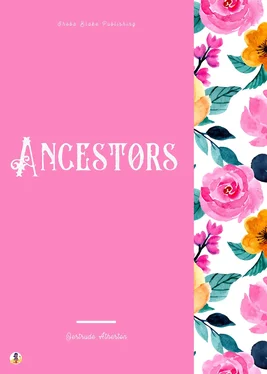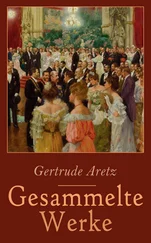Gertrude Atherton - Ancestors
Здесь есть возможность читать онлайн «Gertrude Atherton - Ancestors» — ознакомительный отрывок электронной книги совершенно бесплатно, а после прочтения отрывка купить полную версию. В некоторых случаях можно слушать аудио, скачать через торрент в формате fb2 и присутствует краткое содержание. Жанр: unrecognised, на английском языке. Описание произведения, (предисловие) а так же отзывы посетителей доступны на портале библиотеки ЛибКат.
- Название:Ancestors
- Автор:
- Жанр:
- Год:неизвестен
- ISBN:нет данных
- Рейтинг книги:3 / 5. Голосов: 1
-
Избранное:Добавить в избранное
- Отзывы:
-
Ваша оценка:
- 60
- 1
- 2
- 3
- 4
- 5
Ancestors: краткое содержание, описание и аннотация
Предлагаем к чтению аннотацию, описание, краткое содержание или предисловие (зависит от того, что написал сам автор книги «Ancestors»). Если вы не нашли необходимую информацию о книге — напишите в комментариях, мы постараемся отыскать её.
Ancestors — читать онлайн ознакомительный отрывок
Ниже представлен текст книги, разбитый по страницам. Система сохранения места последней прочитанной страницы, позволяет с удобством читать онлайн бесплатно книгу «Ancestors», без необходимости каждый раз заново искать на чём Вы остановились. Поставьте закладку, и сможете в любой момент перейти на страницу, на которой закончили чтение.
Интервал:
Закладка:
“Order lights and have your trunks brought up,” she said. “I will send one of the housemaids to help you dress. My room is over on the other side of the house—go through that door opposite, and down a corridor until you come to another long hall and staircase like the one on this side. You will find my name on the door. Knock at about a quarter-past eight and I will go down with you. Vicky may be in an angelic humor and she may not. It depends mainly upon whether Jack condescends to turn up. I suppose you know all about him; it would hardly do for you to face him and his mother if you didn’t. He has travelled quite exhaustively in the colonies and given us some of the most informing literature on that subject that we have. He was out in Africa when the Boer War broke out, and once before in India, when there was fighting, volunteered both times and did brilliant service. He has no end of medals with clasps. Then he suddenly went in for politics and announced himself an uncompromising Liberal. It nearly killed his grandfather—Lord Strathland—for Jack is the one person on earth that he loves as much as himself; and it has alienated many of his relatives on both sides—which gave him one more chance to win against terrific odds; he enjoys that sort of thing. He had been in but two years when there was a general election, and he has only just got back—he contested three divisions before he won his seat this time, and he had almost as hard a fight before. Vicky, who hates the Gwynnes, with the exception of Lord Zeal, the heir, besides believing in Jack as you would in Solomon, has steadily upheld him; and she is a powerful ally—not only one of the most distinguished of the political women, but still turns heads when she chooses, and her game is generally in the cabinet preserves, when it is not in the diplomatic. I must run. Put on your most fetching gown. Julia Kaye, a detestable little parvenu, is here. Jack is in love with her and she has chosen another. It will be a cousinly duty to console him. Then you can turn him over to some one else. Ta, ta!” Her last words floated back from the depths of the corridor; a clock was striking and she had pattered off hastily.
III

The “Jack,” whose more distinguished patronymic was so gayly caracolling down the road to posterity, had arrived, and after dressing hastily, sought his mother. Her hair was done, her gown laced; she dismissed her maid at once, and while her eyes melted, in the fashion of mothers, she embraced her son with something more than maternal warmth: a curious suggestion of relief, of stepping out of her own personality and leaving it like a heap of clothes on the floor. This attitude had occasionally puzzled her idol, but he was too masculine to analyze. She was his best friend and a delightful person to have for a mother; her soul might be her own possession undisturbed. He admired her almost as much as he did himself, and to-night he kissed her fondly and told her gallantly that she was looking even more beautiful than usual.
“It is all this white after the dead black,” said Lady Victoria, smiling appreciatively. “I am thankful that prolonged mourning is out of date; it made a fright of me and was getting on my nerves.” She wore no jewels save a high diamond dog-collar and a few sparkling combs in her hair, but she made a superb appearance with the long white sweep of shoulders and bust, her brilliant eyes and smart tailed gown of black chiffon and Irish lace. Her arms, no longer rounded as when artists had fought to paint her, were but half-revealed under floating sleeves, and her fair tapering hands were even younger than her face.
She opened a large black fan and moved it slowly while looking intently at her son’s bent profile. “Something has gone wrong,” she said. “Have you seen Julia Kaye again?”
“No, I was invited to Maundrell Abbey last week, but couldn’t manage it, of course. And I knew she was to be here. Nothing has gone wrong—but I had rather a shock this morning. I met Zeal at the club. He looks like a death’s head. He vowed he was taking even better care of himself than usual, but his chest is bad again. He talked about going to Davos—the very word makes me sick! In the next breath he said he might go out to Africa. Can’t you hurry on his marriage?—persuade Carry that it is her duty to go with him?”
“I should have no difficulty persuading Carry. The rub is with him. Compulsory asceticism has bred misogyny, and misogyny scruples. He says that he has sins enough to his account without laying up a reckoning with posterity. If it were not for you I should agree with him. I feel like a conspirator—”
“There is no reason why his children should be consumptive. Carry’s physique is Wagnerian, and she is just the woman to look after her children herself. Zeal’s health was thrown to the dogs by a weak indulgent frivolous mother, and what she left him he disposed of later when he made as great an ass of himself as might have been expected. He is a hypochondriac now and would keep a close watch on his heir’s health and habits; you may be sure of that. He ought not to be in London now—it is stifling—went up for some business meeting or other—seemed to wish to avoid details. I hope to heaven he has not been relieving the monotony of his life by some rotten speculation. I begged him to come down here, but he wouldn’t—says that his hand is no longer steady enough to hold a gun—it’s awful!—worse because I’m not merely fond of him and regretting the possible loss of a good friend—I have felt like a beast all day. But I can’t help it. For God’s sake write and persuade him to go to Davos at once—and picture the delights of a pretty and devoted nurse. I feel as if I had ashes in my mouth—and yesterday I was so happy!” he burst out, with the petulance of a child.
“I will write to-night,” she said, soothingly. “He has a very slow form of consumption; I have the assurance of his doctors. And at least he has committed himself with Carry, and announced his intention to marry as soon as a sojourn somewhere has made him feel fit again. You know how much better he always is when he comes back. Put it out of your mind to-night. I want you to be as happy as I am. Everybody is talking of the brilliance of your campaign—”
“Much good brilliance will do me if I am to rot in the Upper House!”
“Put it out of your mind; don’t let apprehension control you for a moment. Believe me, will-power counts in life for more than everything else combined, and if it isn’t watched it weakens.”
“All right, mummy. You are never so original as when you preach. So Julia Kaye came down this afternoon? Talk about will. Mine should be of pure steel; I have ordered her out of my consciousness these last weeks at the point of the bayonet. She has written me exactly three times. However—those letters were charming,” he added, with the sudden smile that transfigured his face, routing the overbearing and contemptuous expression that had won him so many enemies; friends and flatterers and the happy circumstances of his life had combined thoroughly to spoil him. “Do you maintain that will can win a woman?” he added, sharply.
She was the woman to laugh outright at such a suggestion. “No, nor that it can uproot love, although it can give it a good shaking and lock it in the dark room. I doubt if you love Julia Kaye, but you will find that out for yourself. You might bring her to terms by flirting a little with your American cousin—”
“My what?” He opened his eyes as widely as he had ever done when a school-boy.
Читать дальшеИнтервал:
Закладка:
Похожие книги на «Ancestors»
Представляем Вашему вниманию похожие книги на «Ancestors» списком для выбора. Мы отобрали схожую по названию и смыслу литературу в надежде предоставить читателям больше вариантов отыскать новые, интересные, ещё непрочитанные произведения.
Обсуждение, отзывы о книге «Ancestors» и просто собственные мнения читателей. Оставьте ваши комментарии, напишите, что Вы думаете о произведении, его смысле или главных героях. Укажите что конкретно понравилось, а что нет, и почему Вы так считаете.









